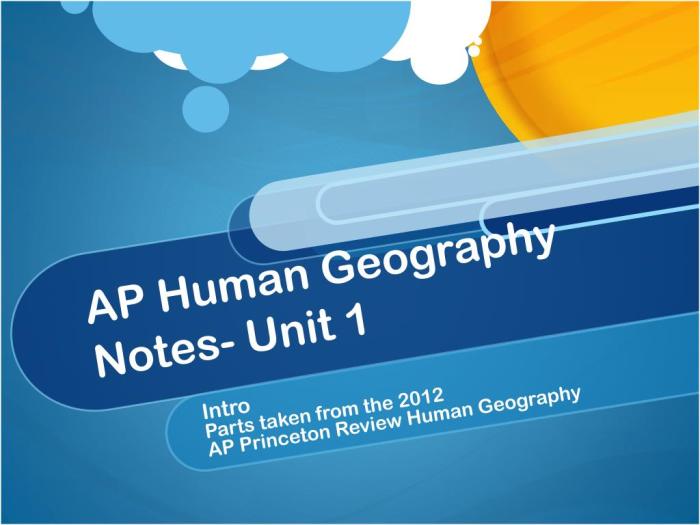Embark on an intellectual journey with our comprehensive guide to the AP Human Geography Unit 1 Test Answers. This meticulously crafted resource unravels the fundamental concepts and themes of human geography, empowering you to excel in your academic pursuits and cultivate a profound understanding of the world around you.
Delving into the intricacies of space, place, and region, we lay the groundwork for comprehending the diverse perspectives and approaches that shape human geography. By exploring the five geographic themes, you will gain invaluable insights into the interconnectedness and influence of location, place, human-environment interaction, movement, and region on human activities.
Key Concepts and Terms
Human geography examines the relationship between humans and their physical and cultural environments. Key concepts include:
- Space:The physical area occupied by humans and their activities.
- Place:A specific location with unique characteristics that give it meaning and identity.
- Region:An area with shared characteristics that distinguish it from other areas.
These concepts are applied in real-world scenarios to understand issues such as population distribution, economic development, and environmental sustainability.
Perspectives and Approaches
Human geographers use various perspectives and approaches, including:
- Spatial analysis:Examining the distribution and patterns of phenomena across space.
- Cultural geography:Studying the relationship between culture and the environment.
- Political geography:Analyzing the spatial dimensions of political power and territoriality.
- Economic geography:Examining the distribution and patterns of economic activity.
Geographic Themes
Five geographic themes provide a framework for organizing and analyzing human geography:
- Location:The absolute and relative position of a place.
- Place:The unique characteristics that distinguish a place from others.
- Human-environment interaction:The complex relationship between humans and their environment.
- Movement:The movement of people, goods, and ideas.
- Region:Areas with shared characteristics that differentiate them from other regions.
These themes are interconnected and influence human activities, such as population distribution, economic development, and environmental sustainability.
Challenges and Opportunities, Ap human geography unit 1 test answers
Each geographic theme presents challenges and opportunities:
- Location:Advantages of accessibility and resources, but also challenges of isolation and vulnerability.
- Place:Unique cultural and environmental assets, but also challenges of preservation and sustainability.
- Human-environment interaction:Opportunities for sustainable development, but also challenges of pollution and climate change.
- Movement:Facilitates economic growth and cultural exchange, but also presents challenges of congestion and inequality.
- Region:Cooperation and shared resources, but also challenges of conflict and inequality.
Data and Methods

Human geographers use various types of data:
- Qualitative data:Non-numerical data that describes and interprets phenomena.
- Quantitative data:Numerical data that can be analyzed statistically.
Data is collected and analyzed using methods such as:
- Surveys:Questionnaires used to gather information from a sample population.
- Interviews:In-depth conversations with individuals or groups.
- GIS (Geographic Information Systems):Software that combines geographic data with other information.
Strengths and Limitations
Each data collection and analysis method has strengths and limitations:
- Surveys:Provide large-scale data, but may be subject to bias and response error.
- Interviews:Offer rich and detailed information, but can be time-consuming and expensive.
- GIS:Allows for spatial analysis and visualization, but requires accurate and up-to-date data.
FAQ Overview: Ap Human Geography Unit 1 Test Answers
What are the key concepts of human geography?
The key concepts of human geography include space, place, and region, which provide a framework for understanding the distribution and patterns of human activities and interactions.
How do the five geographic themes interconnect?
The five geographic themes are interconnected and influence human activities in various ways. For example, location determines the accessibility of resources and opportunities, while place shapes cultural identity and sense of belonging.
What are the challenges and opportunities of human-environment interaction?
Human-environment interaction presents both challenges and opportunities. Challenges include pollution, deforestation, and climate change, while opportunities include sustainable development practices and conservation efforts.